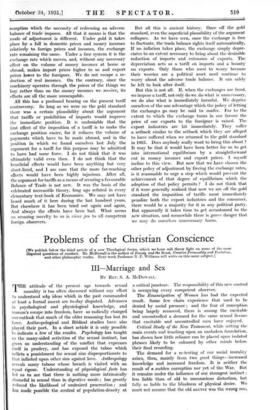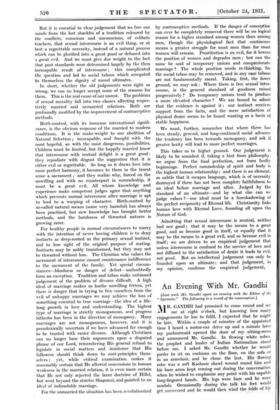Problems of the Christian Conscience
[We publish below the third article of a new Theological Series, which we hope will throw light on some of the inoet disputed questions of conduct. Mr. McDowell is the author of Beauty and the Beast, Creative Peraemality and Evolution, and other philosophic works. Next week Professor N. P. Williams will write on this same subject.]
III—Marriage and Sex
BY REV. S. A. McDowALL.
THE attitude of the present age towards sexual morality is too often discussed without any effort to understand why ideas which in the past commanded at least a formal assent are to-day disputed. Advances in psychological and physiological knowledge, and woman's escape into freedom, have so radically changed our outlook that much of the older reasoning has lost its force. Anthropological and Biblical studies have also played their part. In a short article it is only possible to indicate a few of the results. Psychology has taught us the many-sided activities of the sexual instinct, has given us understanding of the conflict that expresses itself in prudery, and has exposed the taboo which inflicts a punishment for sexual sins disproportionate to that inflicted upon other sins against love. Anthropology reveals many taboos whose breach is visited with an equal rigour. Understanding of physiological facts has led us to see that there is nothing more intrinsically shameful in sexual than in digestive needs ; has greatly reduced the likelihood of undesired procreation ; and has made possible the control of population-density at a critical juncture. The responsibility of this new control is occupying every competent observer.
The Emancipation of Women has had the expected result. Some few claim experience that used to be denied by social pressure ; and the fear of conception being largely removed, there is among the excitable and uncontrolled a demand for the same sexual licence that excitable and uncontrolled men have enjoyed.
Critical Study of the New Testament, while setting the main events and teaching upon an unshaken foundation, has shown how little reliance can be placed upon isolated phrases likely to be coloured by other minds before their final recording.
The demand for a re-testing of our social morality arises, then, mainly from two good things—increased knowledge and increased freedom. It is neither the result of a sudden corruption nor yet of the War. But it remains under the influence of our strongest instinct : less liable than of old to unconscious distortion, but fully as liable to the blindness of physical desire. We must not assume that the old answer was the wrong one. But it is essential to clear judgement that we free our minds from the last shackles of a tradition coloured by the conflicts, conscious and unconscious, of celibate teachers, that sexual intercourse is an evil thing, or at best a regrettable necessity, instead of a natural process which can be glorified into a great good or debased into a great evil. And we must give due weight to the fact that past standards were determined largely by the then inescapable result of intercourse ; this complicated the question and led to social taboos which arrogated to themselves the dignity of moral ultimates.
In short, whether the old judgements were right or wrong, we can no longer accept some of the reasons for them. This is the real cause of our unrest. The problems of sexual morality fall into two classes affecting respec- tively married and unmarried relations. Both are profoundly modified by the improvement of contraceptive methods.
Birth-control, with its immense international signifi- cance, is the obvious response of the married to modern conditions. It is the make-weight to our abolition of Natural Selection ; inescapable, and fraught with the most hopeful, as with the most dangerous, possibilities. Children must be limited, but the happily married know that intercourse with mutual delight is a great good : they repudiate with disgust the suggestion that it is either evil or regrettable. So long as it draws love into more perfect harmony, it becomes to them in the truest sense a sacrament ; and they realize why, forced on the unwilling and with no counterpart in comradeship, it must be a great evil. All whom knowledge and experience make competent judges agree that anything which prevents normal intercourse after marriage is apt to lead to a warping of character. Birth-control by so-called natural means (some very harmful) has always been practised, but new knowledge has brought better methods, and the harshness of thwarted natures is growing rarer.
For healthy people in normal circumstances to marry with the intention of never having children is to deny instincts as deep-rooted as the primary sexual instinct, and to lose sight of the original purpose of mating. Instincts may be nobly transformed, but they may not be thwarted without loss. The Christian who values the sacrament of intercourse cannot countenance indifference to the sacrament of the family. Yet special circum- stances—blindness or danger of defect—undoubtedly form an exception. Tradition and taboo make unbiassed judgement of the problem of divorce difficult. A high ideal of marriage makes us loathe unwilling fetters, yet there is danger that in trying to free ourselves from the evil of unhappy marriages we may achieve the loss of something essential to true marriage—the idea of a life- long growth in love and understanding. The highest type of marriage is strictly monogamous, and progress hitherto has been in the direction of monogamy. Many marriages are not monogamous, however, and it is paradoxically uncertain if we have advanced far enough to be trusted with' easier divorce. Although Christians can no longer base their arguments upon a disputed phrase of our Lord, remembering His general refusal to legislate in social matters and insistence that His followers should think down to root-principles them- selves ; yet, while critical examination makes it reasonably certain that He allowed concessions to human weakness in the married relation, it is even more certain that He not only rejected the laxer doctrine of Hillel, but went beyond the stricter Shan-mai, and pointed to an ideal .of indissoluble marriage.
For the unmarried the situation has been revolutionized by contraceptive methods. If the danger of conception can ever be completely removed there will be no logical reason for a higher standard among women than among men, though the physiological fact that continence means a greater struggle for most men than for most women will remain. Prostitution is an evil, for it lowers the position of women and degrades men ; but can the same be said of temporary unions and companionate marriage ? The whole position needs re-thinking, for the social taboo may be removed, and in .any ease taboos are not fundamentally moral. Taking, first, • the lower ground," we may ask : Where there is free sexual 'inter- course, is the general standard of goodness raised progressively ? Do temporary unions tend to produce a more elevated character ? We are bound to admit that the evidence is against it : our instinct receives support from the facts, and the mere satisfaction of physical desire seems to be found wanting as a basis of stable happiness.
We must, further, remember that where there has been steady, general, and long-continued social advance the tendency has been towards monogamy, and ask it greater laxity will lead to more perfect marriages.
This takes us to higher ground. Our judgement is likely to be soundest if, taking a hint from 'philosophy, we argue from the final perfection, not from faulty beginnings. Perfect comradeship of spirit and body is the highest human relationship ; and there is an element, so subtle that it escapes language, which is of necessity destroyed if there has not been complete faithfulness to an ideal before marriage and after. Judged by the standard of an ultimate—and by what else can we judge values ?—our ideal must be a foreshadowing of the perfect reciprocity of Eternal life. Christianity links human love with Eternal Love, founding all upon the Nature of God.
Admitting that sexual intercourse is neutral, neither bad nor good ; that it may be the means to a great good, and so become good in itself, or equally that it may be the means to a great evil, and so become evil in itself; we are driven to an empirical judgement that unless intercourse is confined to the service of love and not diffused to the satisfaction of desire it leads to evil, not good. But an intellectual judgement can only be founded upon an ultimate; and that judgement, in my opinion, confirms the empirical judgement.















































 Previous page
Previous page